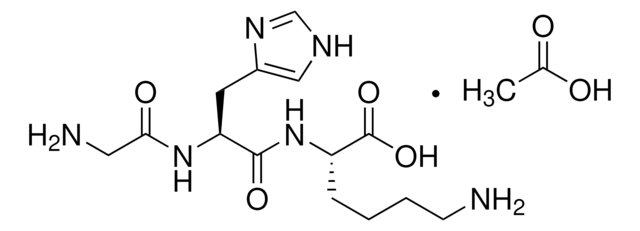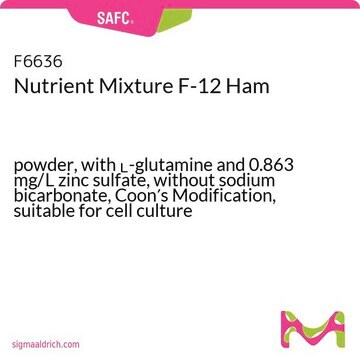G7387
Gly-His-Lys acetate salt
BioXtra, γ-irradiated, suitable for cell culture
Synonyme(s) :
Liver cell growth factor
About This Item
Produits recommandés
Source biologique
synthetic (organic)
Niveau de qualité
Stérilité
γ-irradiated
Gamme de produits
BioXtra
Forme
powder
Poids mol.
400.43 g/mol
Conditionnement
pkg of 5 mg
Technique(s)
cell culture | mammalian: suitable
Impuretés
<2 EU/mL
Couleur
white
Solubilité
H2O: soluble 0.5 mg/mL, clear, colorless
Température de stockage
−20°C
Chaîne SMILES
CC(O)=O.NCCCC[C@H](NC(=O)[C@H](Cc1c[nH]cn1)NC(=O)CN)C(O)=O
InChI
1S/C14H24N6O4.C2H4O2/c15-4-2-1-3-10(14(23)24)20-13(22)11(19-12(21)6-16)5-9-7-17-8-18-9;1-2(3)4/h7-8,10-11H,1-6,15-16H2,(H,17,18)(H,19,21)(H,20,22)(H,23,24);1H3,(H,3,4)/t10-,11-;/m0./s1
Clé InChI
MGNUTAFMLGJBGV-ACMTZBLWSA-N
Vous recherchez des produits similaires ? Visite Guide de comparaison des produits
Amino Acid Sequence
Application
- as a component of the serum-containing medium to culture human thyroid cells
- as a supplement to culture fisher rat thyroid cells
- as a component of the Dulbecco′s modified Eagle Medium (DMEM)/HamF12/mesenchymal stem cell media to culture mesenchymal stem cells
Code de la classe de stockage
11 - Combustible Solids
Classe de danger pour l'eau (WGK)
WGK 3
Point d'éclair (°F)
Not applicable
Point d'éclair (°C)
Not applicable
Certificats d'analyse (COA)
Recherchez un Certificats d'analyse (COA) en saisissant le numéro de lot du produit. Les numéros de lot figurent sur l'étiquette du produit après les mots "Lot" ou "Batch".
Déjà en possession de ce produit ?
Retrouvez la documentation relative aux produits que vous avez récemment achetés dans la Bibliothèque de documents.
Les clients ont également consulté
Notre équipe de scientifiques dispose d'une expérience dans tous les secteurs de la recherche, notamment en sciences de la vie, science des matériaux, synthèse chimique, chromatographie, analyse et dans de nombreux autres domaines..
Contacter notre Service technique







